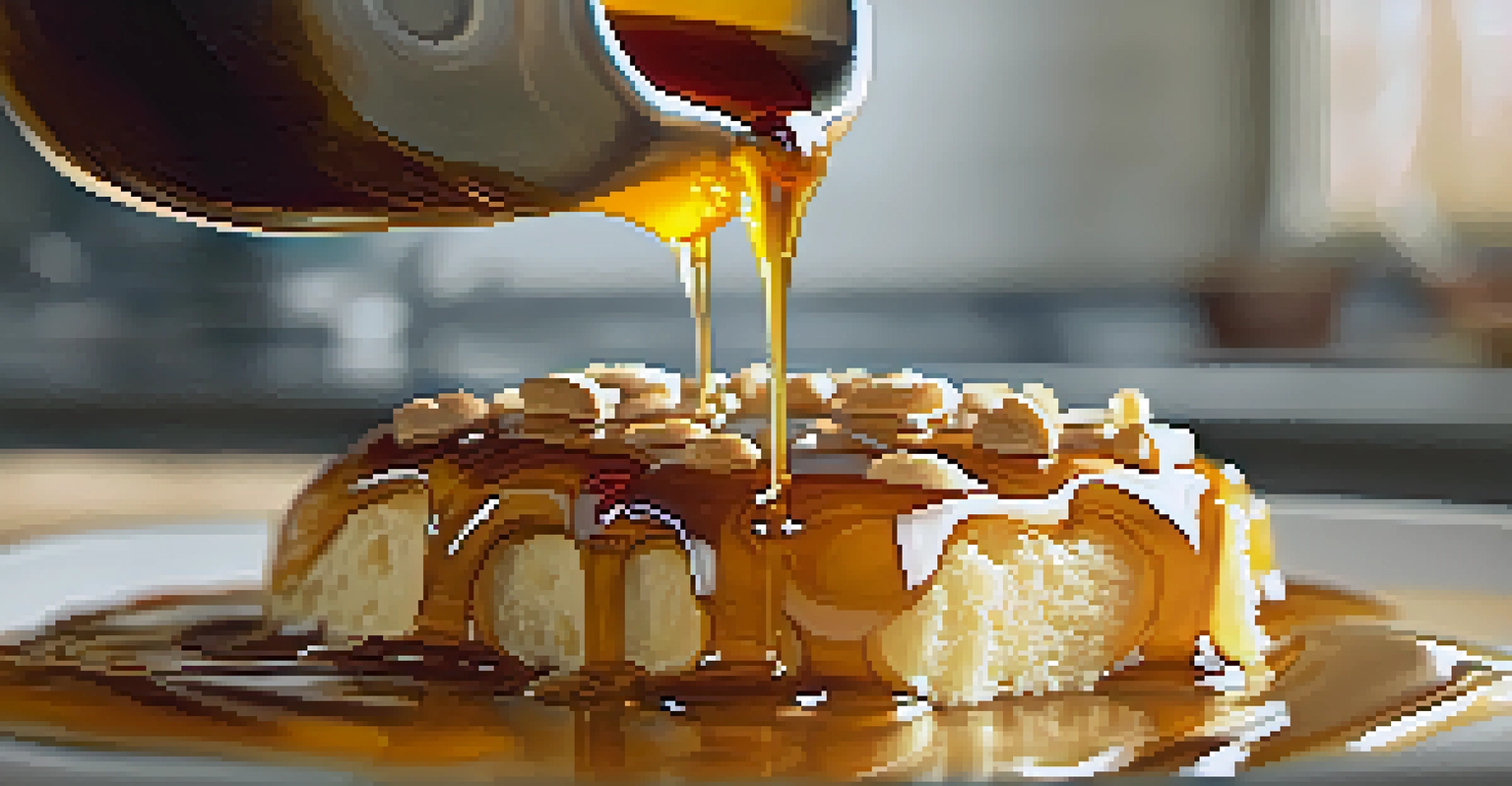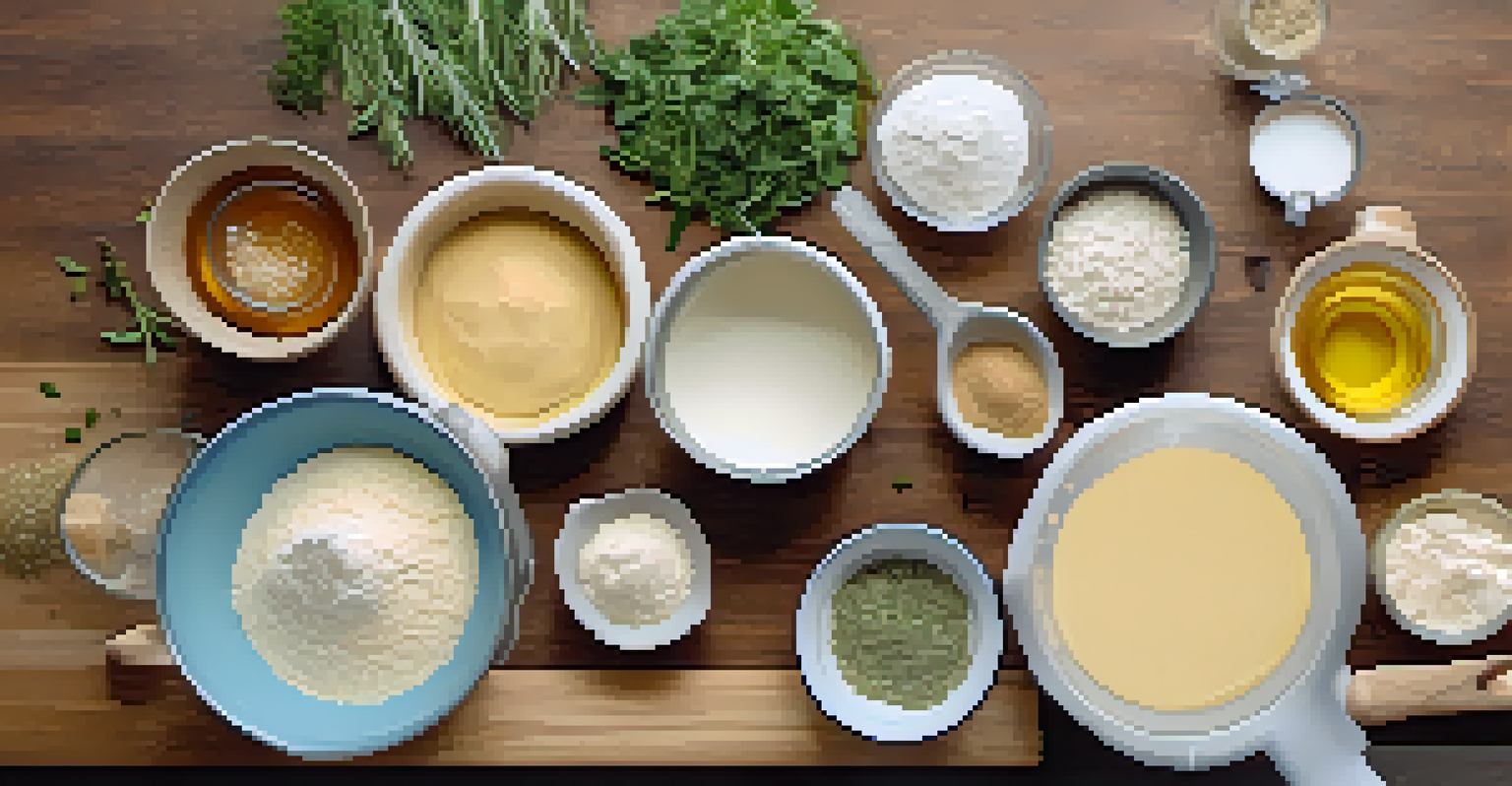How to Create Vegan Pastries Without Sacrificing Flavor

Understanding Vegan Pastry Ingredients for Flavor
Creating vegan pastries starts with understanding the right ingredients. Traditional pastries often rely on butter and eggs for richness, but there are fantastic plant-based alternatives. Ingredients like coconut oil, nut butters, and flaxseed meal can mimic the texture and flavor that butter and eggs provide without sacrificing taste.
Let food be thy medicine and medicine be thy food.
For instance, coconut oil gives pastries a lovely, flaky texture similar to butter, while flaxseed meal acts as a binding agent when mixed with water. These substitutes not only help retain the pastries’ integrity but also introduce unique flavors that enhance the overall experience. It’s all about experimenting to find the right balance that works for you.
Remember, the goal is to keep the essence of pastries intact while embracing the vibrancy of plant-based ingredients. With a little creativity and an open mind, you can craft vegan pastries that are just as delightful as their traditional counterparts.
Exploring Flavorful Vegan Dairy Alternatives
Dairy can be a significant source of flavor in traditional pastries, but vegan alternatives are abundant and delicious. Unsweetened almond milk, oat milk, and coconut milk can bring creaminess to your doughs and fillings. Each of these options has its own unique flavor profile that can enhance the pastry experience.

For example, coconut milk can add a subtle sweetness and richness, making it an excellent choice for creamy fillings. On the other hand, almond milk contributes a nuttier flavor that pairs well with chocolate or fruit-based pastries. Choosing the right dairy alternative can elevate your pastry game while keeping everything plant-based.
Key Vegan Ingredients for Pastries
Understanding plant-based substitutes like coconut oil and flaxseed meal can help create rich and flavorful vegan pastries.
Don’t forget to consider vegan cream cheeses or yogurts for fillings as well! These alternatives can provide that creamy texture and tanginess often found in traditional pastries, making your creations both satisfying and flavorful.
Utilizing Natural Sweeteners for a Healthier Touch
When it comes to sweetening your vegan pastries, there are plenty of natural alternatives that don’t compromise flavor. Maple syrup, agave nectar, and date sugar are excellent options that provide a rich sweetness while adding their distinct flavors. They can enhance your pastries without the guilt of refined sugars.
The greatest wealth is to live content with little.
For instance, using maple syrup in a pie filling not only sweetens but also adds a warm, rich flavor that pairs wonderfully with spices. Similarly, date sugar, made from dried dates, gives a caramel-like taste that can add depth to cakes and pastries alike. These options allow you to enjoy your treats while being mindful of your health.
Experiment with different sweeteners to find what works best for your palate and your pastry. The right choice can transform an ordinary pastry into something extraordinary, showcasing the versatility of vegan baking.
Incorporating Fresh Fruits for Natural Flavor
Fresh fruits are not only delicious but also a fantastic way to boost the flavor of your vegan pastries. Berries, apples, and bananas can be used in various pastries to add natural sweetness and moisture. When baked, these fruits caramelize, enhancing their flavors and contributing to a more complex taste.
For example, incorporating ripe bananas into a pastry dough can create a moist texture while adding sweetness and flavor. Similarly, a berry compote can serve as a delightful filling or topping, providing bursts of tartness that balance out the sweetness of the pastry. This approach not only elevates the flavor but also adds nutritional value.
Natural Sweeteners Enhance Flavor
Using natural sweeteners such as maple syrup and date sugar can add unique flavors to vegan pastries while being healthier than refined sugars.
Try experimenting with different fruits in your recipes to discover new flavor combinations. The versatility of fruits allows you to get creative, resulting in unique pastries that are both satisfying and wholesome.
Herbs and Spices: Elevate Your Vegan Pastries
Don't overlook the power of herbs and spices when creating vegan pastries. These ingredients can add depth and complexity to flavors, transforming a simple recipe into something extraordinary. Cinnamon, nutmeg, and vanilla are popular choices that can enhance sweetness, while fresh herbs can bring an unexpected twist.
For instance, a hint of rosemary or thyme can add an aromatic quality to savory pastries, while cinnamon can elevate sweet treats like apple turnovers. The key is to start with small amounts and adjust according to your taste preferences, as herbs and spices can be quite potent.
Incorporating these elements not only makes your pastries more flavorful but also allows you to experiment with different culinary traditions. The world is full of flavor possibilities waiting to be explored in your vegan baking adventures.
Choosing the Right Flour for Texture and Taste
The type of flour you choose can significantly impact the texture and flavor of your vegan pastries. While all-purpose flour is a common choice, exploring alternatives like almond flour, whole wheat flour, or spelt flour can add unique flavors and health benefits. Each type of flour has its characteristics that can change the outcome of your pastries.
For example, almond flour can lend a nutty flavor and moist texture, making it perfect for cookies and cakes, while whole wheat flour adds a wholesome taste and extra fiber. Experimenting with different blends can help you find the perfect combination for your recipes, leading to delightful surprises.
Flour Choice Impacts Texture
Selecting the right type of flour, like almond or whole wheat, can significantly influence the taste and texture of vegan pastries.
Don’t be afraid to mix flours to achieve the desired taste and texture. Combining different types can also add a beautiful complexity to your pastries that will impress anyone who takes a bite.
Perfecting Baking Techniques for Vegan Pastries
Baking vegan pastries successfully often comes down to mastering a few key techniques. Proper mixing, the right temperature, and timing play crucial roles in achieving the perfect texture and flavor. For example, over-mixing can lead to dense pastries, while under-baking can result in soggy bottoms.
Paying attention to details like chilling your dough or allowing it to rest can greatly enhance the final product. Chilling ensures that fats remain solid during baking, helping your pastries maintain their shape and flakiness. Similarly, letting the dough rest allows for better gluten development, leading to a more tender pastry.

Taking the time to understand these techniques can make a world of difference in your baking adventures. With practice and patience, you'll be able to create vegan pastries that are not only flavorful but also beautifully crafted.